- Home
- Collins, Max Allan
Mourn The Living Page 5
Mourn The Living Read online
Page 5
Nolan tried the Globe again, couldn’t get Davis, then got up from bed and, phone book under his arm, left the room, grabbing his tan suitcoat from the chair. He went out to the Lincoln, climbed in and roared toward Chelsey.
As he drove through the shaded residential streets, Nolan felt Chelsey was more a postcard than a city. He had heard there was a slum in Chelsey, but that he would have to see to believe.
In seven minutes he reached the downtown area. It was a typical small-town business district, built around a square, with all the businesses enclosing a quaint crumbling courthouse which stood in the center collecting dust. There were people bundled warmly against the cold Illinois wind, rushing up and down the sidewalks, visibly pained to move that quickly. Birds and bird-dung clung to the courthouse and Nolan wondered why the hell they didn’t fly south or something. At first Nolan didn’t see any old men in front of the courthouse, as he expected there to be, but after he parked his car and walked half-way around the square, he saw them at last. They were sitting in the shade of a large leafy tree, bench-bound, tobacco-mouthed, as motionless as the twin Civil War cannons in front of them.
He checked Dillon’s Tap, found it empty except for a blowsy redhead talking to the bartender. No Davis, no other reporters to ask about Davis.
He didn’t find Davis or colleagues in the Eastgate Tavern, where two on-duty policemen were drinking beer. He didn’t want to talk to them.
Nolan went back to his rented Lincoln and headed toward the Chelsey University campus, which lay beyond the downtown district. The downtown continued on three streets north of the square, made up primarily of collegiate shops and bookstores; then the campus lay just after that, on a bluff overlooking the Chelsey River.
The river was little more than a wide stream, with several footbridges and four traffic bridges crossing it. The rest of Chelsey and the C.U. campus, football stadium included, were on the other side of the river. Nolan drove over the Front Street bridge and saw a large unlit neon saying Big 7. He pulled into the parking lot and went in.
The place was dark and smoke hung over it like a gray cloud. Nolan couldn’t tell whether or not, as the motel manager had said, it was a fairly nice restaurant, simply because he couldn’t see it very well. All he could see clearly were football action shots trying in vain to break the monotony of the room’s pine-paneled walls. Then he spotted two men in wrinkled suits, one blue and one grey, standing at the bar arguing over a long dead play out of a long dead Rose Bowl game.
“Excuse me,” Nolan said.
The two guys stopped mid-play and gave Nolan twin what-the-hell-do-you-want sneers.
Nolan said, “Where can I find Hal Davis?”
The two guys looked at each other in acknowledgment of Nolan being a stranger to both of them. Then one of the guys, a chunky ex-high school tackle perhaps, said, “Maybe Hal Davis likes privacy. Maybe he don’t care to be found.”
“If you know where he is, I’d appreciate it you tell me.”
The guy looked at Nolan, looked at Nolan’s eyes.
“He’s over at the corner table. Facin’ the wall.”
Nolan nodded.
The two men returned to the play and Nolan headed for the corner table, where a sandy-haired man of around fifty sat nursing a glass of bourbon.
“Mr. Davis?”
He glanced up. His eyes were blood-shot and heavily bagged and the hands around the glass were shaky. He wasn’t drunk, but he wished he was. His lips barely moved as he said, “I don’t know you, mister.”
“My name’s Webb. Care if I sit?”
“I don’t care period.”
Nolan sat. He looked at Davis, caught the man’s eyes and held them. “You look like a man who got pushed and didn’t like it.”
Davis shook Nolan’s gaze and stared into his glass of bourbon. “I said I don’t know you, Webb. I think maybe I don’t want to know you.”
Nolan shrugged. “I’m telling people I’m a magazine writer, Mr. Davis. But that’s not who I am or why I came to Chelsey.”
“Why, then? You come to drop out and turn on?”
“I’m a private investigator,” Nolan told him. “From Philadelphia. I been hired by a client . . . who’ll remain nameless of course . . . to contact a Mr. George Franco.”
Davis said, “You know something, Webb? You don’t look like a private investigator to me. You look like a hood. You got something under your left armpit besides hair, your fancy suit isn’t cut so well that I can’t tell that. What’s it you’re after in Chelsey? You got a contract on Franco?”
“No. What if I did?”
“I wouldn’t give a damn.”
“You getting shoved around by the Boys, Mr. Davis?”
“The boys? What boys are those?”
So, Nolan thought, maybe Davis doesn’t know about the Chelsey hook-up with the Chicago outfit; maybe he’s just a small-town newsman getting pressured by “local hoods.”
Nolan said, “Let me put it this way . . . are George Franco and his associates telling you what to say in the Globe?”
“You mean what not to say, don’t you? Sure, they’re tellin’ me, and they got some pretty goddamn persuasive ways of telling, too.”
“I want Franco’s address.”
Davis downed the dregs of the bourbon. He smiled; one of his front teeth was chipped in half. “I’ll get it capped one of these days,” he said, gesturing to it with the emptied shot glass. “For a while I’m leavin’ it like this, so I can look in the mirror when I get up mornings and think about what a chicken-shit I am.”
Nolan said, “Franco’s address.”
Davis shook his head. “It’s not an address. It doesn’t exist, not officially, anyway. It’s a fancy penthouse deal, only it’s above a drug store. Berry Drug, right down on the square, across from the courthouse and cannons. There’s a fire escape in back that’ll lead you to a bedroom window.”
“Any bars on it?”
“Nope. Just a regular glass window. They don’t bother protecting fat George that much. Thinks his place is a real secret.”
“Is it?”
“It was.” He grinned his air-conditioned grin. “But it looks like the secret’s out, doesn’t it?”
Nolan dropped a twenty on the table and left.
He drove back across the bridge and parked his car several blocks away from Berry Drug. He went into a hardware store and bought a glass-cutter, then walked to the courthouse lawn. He sat on one of the benches by an old man who smelled like a urinal and watched the drug store for about an hour. A black-haired whore in a short black shift came out, then a thin man in a powder-blue suit went in and came back out in less than ten minutes.
After a while Nolan strolled around behind the drug store and climbed the fire escape and used the glass-cutter on the window. It was broad daylight, but the ’scape was at an angle and Nolan figured a daytime attack would be less expected.
He slipped into the plush red-carpeted flat, and crept over to the bed, where an extremely fat man in a silk dressing gown lay on his stomach, half-asleep and talking to himself.
Nolan got out his .38 and, after a brief exchange of conversation, introduced himself to George Franco. “My name’s Nolan.” It was four fifteen p.m.
Back in Peoria Sid Tisor was wondering if Nolan had reached Chelsey yet.
2
NOLAN STROLLED over to the bar, laid his gun on the counter and helped himself to a shot of Jim Beam. He glanced over at George, who was sitting on the edge of the bed, his plump fists clenching the bedspread. George’s forehead was beaded with sweat; his mouth hung loosely above two double chins.
Nolan asked George if he wanted a drink.
George tried to answer yes but couldn’t spit it out.
Nolan, seeing an open bottle of Haig and Haig on the counter, poured a healthy glass of Scotch and dropped in an ice cube. He retrieved his .38 from the counter and took the glass of Scotch to George, who grabbed for it and began sloshing it down.
&n
bsp; Nolan dragged a chair to the bed and sat.
“Let’s talk, George.”
“You must be out of your mind!”
“You’re not the first to suggest that.”
“What are you doing here? What do you want?”
Nolan shrugged. “I just want to ‘rap.’”
“When my brother Charlie finds out about you bein’ in Chelsey . . .”
Nolan lifted the .38 and let him look down the long barrel. “Your brother isn’t going to find out, George. And neither are any of your associates.”
George’s eyes golf-balled. “You . . . you think you can threaten me? Me? I’m a Franco!”
Nolan, his mouth a grim line, said, “So was Sam.”
George Franco looked into the flint grey eyes of the man who had murdered Sam Franco. He swallowed hard.
Nolan lowered the .38. “I won’t hurt you unless I have to. I got a hunch this deal doesn’t have a lot to do with you.”
“What are you talking about?”
Nolan finished the whiskey, went back and poured another. “I’m here to look into a matter. The matter may concern the Chelsey operation you’re involved in. And it may not.”
George was trembling, like a huge bowl of fleshy gelatin. “What . . . what do you want from me?”
“Information.”
“What kind?”
“Different kinds. Let’s start with a name. Irene Tisor. What does that name mean to you?”
“A girl, that’s all.”
“What about her?”
“She fell off a building.”
“Is that all you know about her?”
“She was on LSD.”
“Did she fall?”
“I don’t know.”
“You said she fell.”
“She could have.”
“Was she pushed?”
“I don’t know.”
“What connection does your operation have with her death?”
“She got the LSD from one of our sellers, I suppose. So we put on some pressure to cover it up. We didn’t want feds coming in and bothering us.”
“What kind of pressure, George?”
“I don’t know.”
“Had you ever heard the name Irene Tisor before?”
“No . . . I got a brother-in-law named Tisor. You probably knew him from Chicago. Sid Tisor?”
“I heard the name before,” Nolan said.
“You don’t suppose Irene Tisor was a relative? His kid or something?”
“You tell me.”
“Naw, I don’t think so. Back in the old days, Sid was nicer to me than a lot of people; we keep in touch. Just last week we talked on the phone and he didn’t say a word about any relative of his being killed in Chelsey.”
Nolan grunted noncommittally. Well, looked like George didn’t connect Irene to Sid. But then how much did George really know about the operation?
“What kind of money you getting for one hit of LSD?”
George said, “I don’t know.”
“You selling pot?”
“Sure.”
“How much is a lid going for?”
“I don’t know.”
“You selling heroin?”
“I don’t know.”
“What percent of your income’s from selling alcohol to underage buyers?”
“I don’t know.”
“How about barbiturates? Amphetamines?”
“I don’t know.”
Nolan rose, balled his fist and resisted the urge to splatter fat George all over the fancy apartment. He holstered the .38 and got out his cigarettes. Lighting one, he said, “You don’t have a goddamn thing to do with the operation, do you, George?”
George’s face flushed. “I do so! I . . . I . . .”
“You what?”
“I supervise! I do a lot of things . . . I . . .”
Nolan ignored him. “Who’s the boss?” George didn’t say anything. “Somebody’s got to run the show. Who is it?”
George remained silent.
Nolan took out the gun again, disgustedly. “Who, George?”
George’s face turned blue.
“I’m going to have to get nasty, now, George.”
“It’s Elliot!” he sputtered. “Elliot, Elliot.”
“Elliot. He’s your . . . secretary?” Nolan searched his mind for the expression Tisor had used in describing the position.
“Yes, my financial secretary.”
“What’s his full name?”
“Irwin Taylor Elliot.”
“Where’s he live?”
“In town, on Fairport Drive. It’s a fancy residential district. High rent.”
“What’s his address?”
“I don’t know . . . but it’s in the phone book.”
“He’s got a listed number?”
“He’s got a real estate agency that fronts him.”
“Is there anybody else with power in town?”
“Just Elliot’s cousin—the police chief.”
“That’s handy. What’s his name?”
“Saunders. Phil Saunders.”
Nolan drew on the cigarette, blew out a cloud of smoke. “If you’re holding out any information, George, it’s best you tell me now.”
George shook his head no. “I don’t know nothing else.”
“You’re a good boy, George.” Nolan walked around the room for a few minutes, playing mental ping-pong. Then he said, “How do you get in this place . . . besides up the fire escape?”
“Through a door next to the can downstairs, in the drug store.”
“Fitting. Any of your men down there?”
“During store hours there’s always either a clerk or an assistant pharmacist on duty downstairs to watch out for me.” George’s face twisted bitterly for a moment. “Sure do a hell of a job protecting me, don’t they?”
“Swell,” Nolan agreed. “You got a phone here?”
“Yeah.”
“What’s the number?”
“CH7-2037. Why?”
“Is it bugged?”
“I don’t think so. Why would they bother checking up on me?”
“You got a point.” Nolan repeated the number to himself silently. “You’ll be hearing from me now and then, George.”
George looked pleadingly at Nolan. “Look, I don’t know anything. You aren’t gonna get any good out of hurting me. You . . . you aren’t gonna . . . do anything to me . . . are you?”
Nolan hunted for an ash tray, found one, stabbed out his cigarette. “I won’t touch you, George, unless you cross me. But finger me and you’re dead.”
“Oh, I wouldn’t. . . .”
“I should put a bullet in your head right now, when I think of it. You’re a bad risk.”
“Oh, no, you can’t. . . .”
“I can, and I have. I killed six men in the past eight years. Not to mention the ones I left wounded.”
“I never did anything to you, Nolan. . . .”
“Don’t sic anybody on me and we’ll get along fine. But you tell your brother about me, or that Elliot, or anyone else, and you’ll die wishing you hadn’t.”
“Nolan, I wouldn’t. . . .”
“Shut up. You don’t think I’m working alone, do you?”
“What?”
“I got three men watching you,” Nolan lied. “They’ll kill you the moment anybody puts a hand on me. So getting rid of me would only assure you of dying.”
George lay back on the bed and moaned. He looked like a beached whale, only whales didn’t sweat.
Nolan finished his whiskey and headed for the window.
3
THE NATIONAL ANTHEM woke Nolan and he sat up on the bed and checked his watch. Quarter after twelve. He had returned to the Travel Nest after eating at the steak house across the way and watched television until it put him to sleep. Now he felt wide awake; and his shoulders, his back, felt tense.
He got out of the now-wrinkled tan suit and put on his black swim
trunks. He grabbed up a pack of cigarettes and matches, draped a towel over his shoulders and headed down the hall.
The door leading into the pool was closed but not locked. A sign hung on it reading “Life Guard on Duty 9 a.m. to 9 p.m. The management cannot be responsible for after-hour swimmers. Swim only at your own risk. T. C. Barnes, Manager.”
It was a small pool, filling most of a small room. From the door to the pool was an area where people could stretch out beach towels and dump their belongings while swimming. Other than that initial area beyond the entrance, there was a scant three feet around the pool’s edge bordering it. Paintings of sea horses rode the blue walls, and the air hung thick with heat and chlorine.
He dove in the deep end and swam several laps and turned over on his back for a while; then he climbed out and dove off the little diving board at the far end of the pool.
Swimming on his back again, Nolan relaxed and enjoyed the warmth of the pool, the all-encompassing feeling of the water around him. Even in a thimble like this, Nolan got a sensation of freedom when swimming. It gave him room to reach out.
Several minutes later Nolan heard the door open. Another late swimmer, a young lady perhaps? That’d be nice, Nolan thought, floating on his back. Then his fantasy was over before it began when his ears reported heavy, plodding footsteps splashing in the dampness of the room.
“Everybody out of the pool,” a harsh voice grated. Nolan swam to one side, set his hands in the gutters and pushed himself out. He stood and looked at the intruders.
Two men, obviously local color. A Mutt and Jeff combination.
The short one, a pale, bloodless-looking specimen, owned the low voice. He wore a pink shirt with red pin-stripes, with a thin black tie loosened around the collar, and a gold sportcoat. His brown slacks were uncuffed and ended a little high over his white socks and brown shoes.
His companion was a tall and beefy dope who wore a grey business suit a size too small. His eyes were expressionless brown marbles under a sloping forehead; his features were hard and battered, his cheeks acned. His mouth, though, was surprisingly delicate, almost feminine.

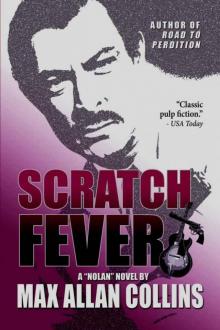 Scratch Fever
Scratch Fever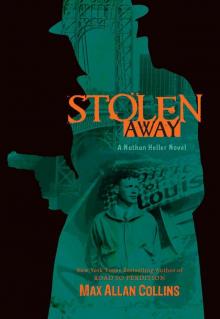 Stolen Away
Stolen Away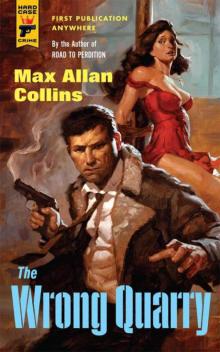 The Wrong Quarry (Hard Case Crime)
The Wrong Quarry (Hard Case Crime) Quarry
Quarry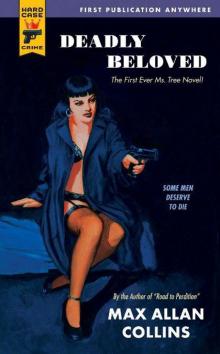 Hard Case Crime: Deadly Beloved
Hard Case Crime: Deadly Beloved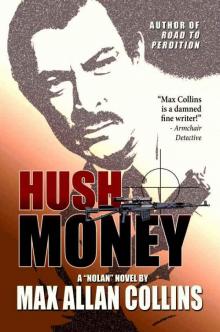 Hush Money
Hush Money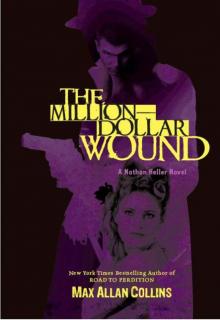 The Million-Dollar Wound
The Million-Dollar Wound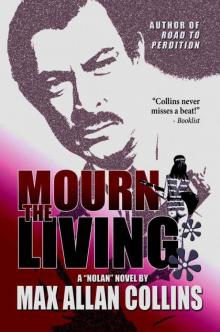 Mourn The Living
Mourn The Living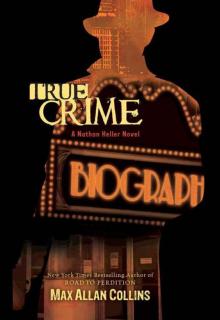 True Crime
True Crime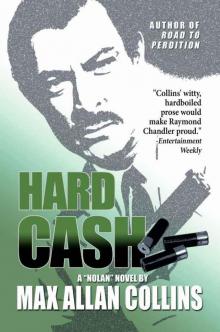 Hard Cash
Hard Cash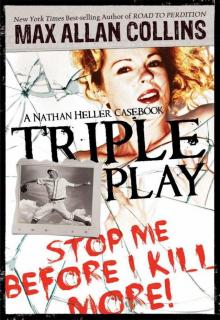 Triple Play: A Nathan Heller Casebook
Triple Play: A Nathan Heller Casebook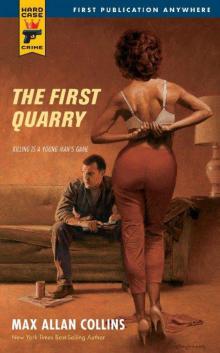 Hard Case Crime: The First Quarry
Hard Case Crime: The First Quarry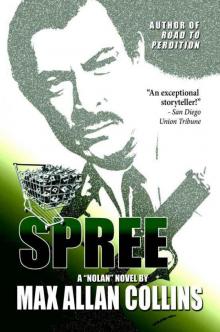 Spree
Spree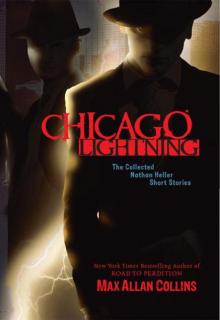 Chicago Lightning : The Collected Nathan Heller Short Stories
Chicago Lightning : The Collected Nathan Heller Short Stories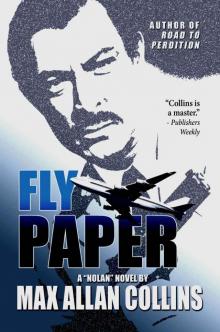 Fly Paper
Fly Paper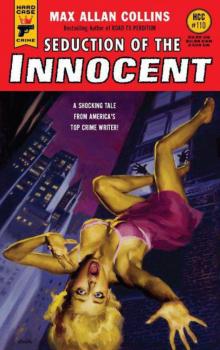 Seduction of the Innocent (Hard Case Crime)
Seduction of the Innocent (Hard Case Crime)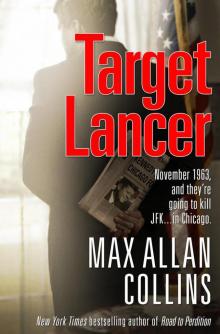 Target Lancer
Target Lancer